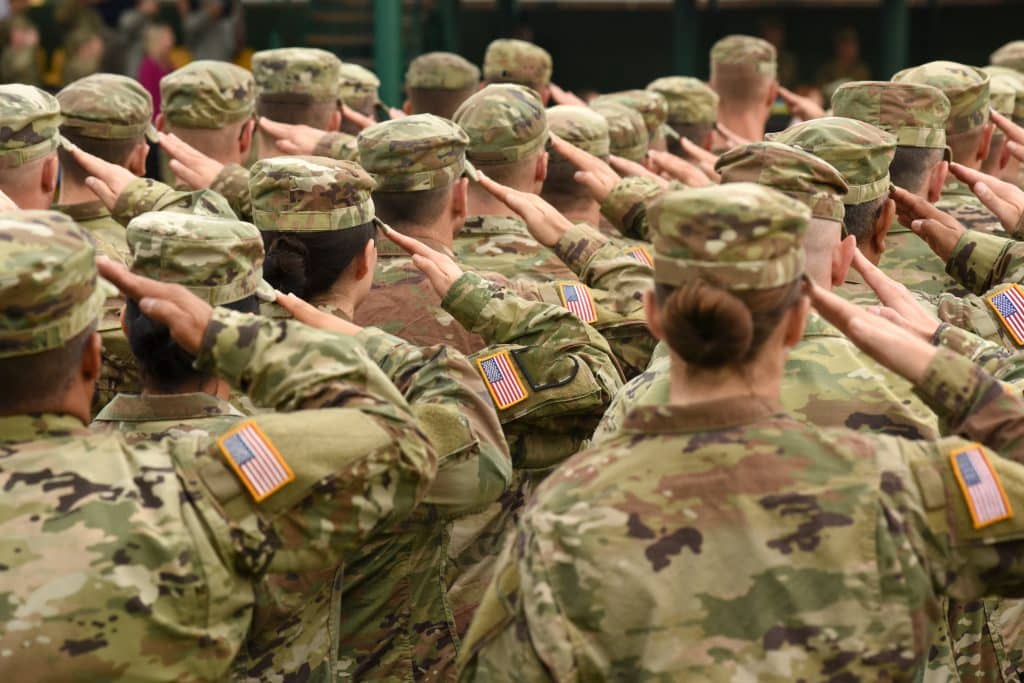
With many Christians (especially in western nations) serving in the military, how do we reconcile Jesus’s teachings of peace with a job that by necessity involves the machinations of war and the killing of others? Of course, the majority of military service members will likely not pull a trigger in combat or directly take a life, but the question remains. Is serving in the military, especially when the assignment involves assignments requiring violence, at odds with the Bible?
Many believers – and nonbelievers, when it suits them in an argument – will claim that Christianity is by definition a pacifist faith and that any act of violence, even in defense, is contrary to the tenets of our Bible. This, like many generalized statements about doctrine, does not tell the whole story.
Was Jesus Really a Pacifist?
This is a major point of theology and a source of great debate. There are, however, several details we can clarify here.
-
What “Turning the Other Cheek” Means
Firstly, it’s vital to clarify what Jesus meant when He spoke of turning the other cheek. This is the most famous passage in Scripture used to justify the notion that believers are to be pacifists.
In context, this statement is part of Christ’s “Sermon on the Mount.” The main message of the entire sermon is that it is better to follow the spirit of the law rather than the letter of the law. In other words, being technical and pedantic about obeying the strictest definition of God’s commands is not what God wants. Jesus provides many examples on both sides of this issue. For instance, helping the needy on the Sabbath is not immoral, but lusting after a woman is, even though working on the Sabbath seems to go against what is written while lusting doesn’t actually constitute adultery. Jesus is telling His audience that they are way too narrowly focused on the details when what is important is what is in the heart.
When it comes to the meaning of turning the other cheek, Jesus’ audience would have understood perfectly what He meant, but we lose a little of the meaning in translation. As Paul T. Penley explains in Turning the Other Cheek: Jesus’ Peaceful Plan to Challenge Injustice: “Roman soldiers tended to be right-handed. When they struck an equal with a fist, it came from the right and made contact with the left side of the face. When they struck an inferior person, they swung with the back of their right hand making contact with the right cheek. In a Mediterranean culture that made clear distinctions between classes, Roman soldiers backhanded their subjects to make a point. Jews were second-class.” Therefore, the slap Jesus refers to is specifically a kind of attack on dignity, and doesn’t even necessarily refer to a physical attack.
It’s ironic that so many people take His statement literally, when again His message was that we are to focus on what’s in our hearts and not so much on the narrow definition of a law. In this case, we are not to retaliate and we are to ignore slights to our dignity – which is not to say that we should allow ourselves and our families to be mercilessly attacked by someone who wants to do us harm.
-
Sell Your Cloak and Buy a Sword
In one of the other most famous examples of Jesus speaking on the topic of violence, Jesus tells His disciples this in Luke 22:36:
“But now, he who has a money bag, let him take it, and likewise a knapsack; and he who has no sword, let him sell his garment and buy one.”
There are multiple interpretations of this statement, including that Jesus told them this in order to fulfill parts of the Isaiah 53 prophecy. Nevertheless, there is no reason not to take this command literally, and we can in fact assume that Jesus did condone or at least allow His disciples to carry weapons, as Peter shortly thereafter uses a sword to cut the ear off of one of the men who came to capture Jesus.
Jesus did not, of course, encourage violence, and discouraged political revolution for the Jews. He likewise commanded Peter to stop when he did cut off the man’s ear in Luke 22:49-51.
That said, the implications in Jesus’s command are quite clear – you are going to be in danger when you spread the gospel, and you are better off with a weapon of self-defense than a cloak or money. At the very least, this is more evidence that Jesus was not inherently against carrying weaponry or defending oneself, which clearly stretches the definition of a pacifist.
Military Influence in the Bible
Even a cursory reading of Scripture will reveal numerous references to soldiers, armies, and battles. Of course, just because something is in the Bible does not mean God is endorsing or condoning it (slavery, abuse, legalism, trickery, and countless other immoral practices also appear in Scripture).
Regardless, it is clear that military service is an honored tradition throughout the Bible and is not treated as inherently evil or contrary to the worship of God. In the Old Testament, God often directly commands the Israelites to destroy and wage war against their enemies, and they give glory to the Lord in doing so. It is debatable, of course, if all the blood that David and Samson and others spilled is applicable to followers of Christ in the modern age, but nevertheless these heroes of ancient Israel are never condemned for their actions as warriors – only for their transgressions against God’s commands.
Even if you discount the many Old Testament figures who actively fought in wars and dismiss their situation as different from our own, the New Testament borrows heavily from Roman and Greek military frameworks to demonstrate a model of proper Christian living. Discipline, teamwork, willingness to sacrifice oneself, braving battles, and preparing oneself with armor and weaponry (physically and spiritually) are just some of the examples that Jesus and the apostles use to paint a picture of how we are to behave.
Perhaps the clearest verse in Scripture on this matter comes from Paul in Romans 13:3-4, where he explains that authorities and soldiers have a right to use force for good and to keep peace:
“For rulers hold no terror for those who do right, but for those who do wrong. Do you want to be free from fear of the one in authority? Then do what is right and you will be commended.
“For the one in authority is God’s servant for your good. But if you do wrong, be afraid, for rulers do not bear the sword for no reason. They are God’s servants, agents of wrath to bring punishment on the wrongdoer.”
At the very least, one has to conclude that serving as a soldier in and of itself is not evil, and is in fact even laudable or heroic. Justice in this world may not be perfect, but all of the material of the New Testament seems to agree that there is a place for just violence and for proper military action, especially in defense of the innocent.
Serving the Government
Another well-known passage on this topic occurs in Matthew 22:15-21, when Jesus tells His audience to give unto Caesar what is Caesar’s – in that instance, referring specifically to taxes and Roman currency.
Titus 3:1, Romans 13:1, and 1 Peter 2:13-17, among other passages, remind us to live within the law of the land, as God has allowed authorities to have their earthly rule. However, Acts 5:29, Isaiah 10:1-2, and Daniel 1:8, among many other examples, demonstrate that we are to obey the Lord over unjust laws. There is, therefore, clearly an area of concern where government service and obedience to the law are against God’s Word.
One can argue that not every government is righteous, which is undeniably true. Even the US, which has historically been a relatively just nation in comparison to many other world powers, has committed many atrocities. The US Army itself perpetrated many of them. Does that mean all soldiers who served during those atrocities bear the guilt of serving an evil nation? Does service to a secular force like a nation’s military have an ethical limit? What should a citizen or a government employee do when his or her nation’s laws contradict the Bible?
These are not easy questions to answer. There is a huge difference between seeking violence and being capable of defending your home or your nation from aggressors. Like many moral quandaries, they often come down to very specific situations where the individual must pray, use discernment, and listen to the Holy Spirit.
To learn more about the Bible and how Christians should navigate living in a fallen world, check out some of the online Bible studies at International School of the Word. Consider starting with our course, “The Influence of the Bible” where David Barton, founder and president of WallBuilders explores the influence of the Bible on the development of our nation. Visit www.ISOW.org today to get started on an affordable online biblical education!
To view courses in Spanish, click here.
Matthew Herr
ISOW, Staff Writer


